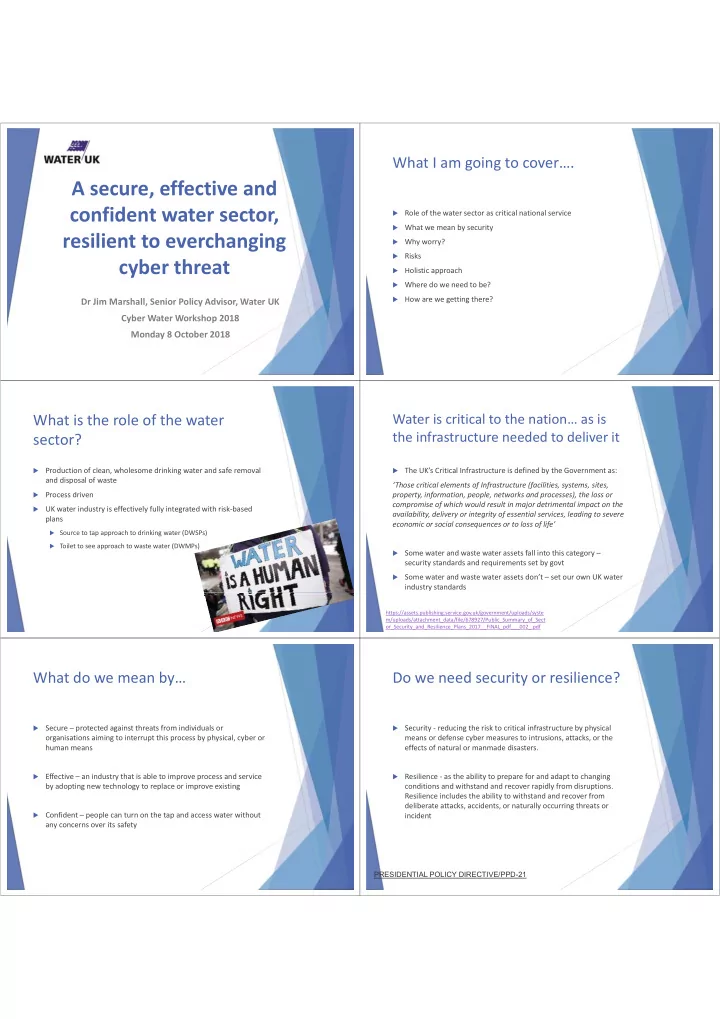

What I am going to cover…. A secure, effective and confident water sector, Role of the water sector as critical national service What we mean by security resilient to everchanging Why worry? Risks cyber threat Holistic approach Where do we need to be? How are we getting there? Dr Jim Marshall, Senior Policy Advisor, Water UK Cyber Water Workshop 2018 Monday 8 October 2018 What is the role of the water Water is critical to the nation… as is the infrastructure needed to deliver it sector? Production of clean, wholesome drinking water and safe removal The UK’s Critical Infrastructure is defined by the Government as: and disposal of waste ‘Those critical elements of Infrastructure (facilities, systems, sites, Process driven property, information, people, networks and processes), the loss or compromise of which would result in major detrimental impact on the UK water industry is effectively fully integrated with risk‐based availability, delivery or integrity of essential services, leading to severe plans economic or social consequences or to loss of life’ Source to tap approach to drinking water (DWSPs) Toilet to see approach to waste water (DWMPs) Some water and waste water assets fall into this category – security standards and requirements set by govt Some water and waste water assets don’t – set our own UK water industry standards https://assets.publishing.service.gov.uk/government/uploads/syste m/uploads/attachment_data/file/678927/Public_Summary_of_Sect or_Security_and_Resilience_Plans_2017__FINAL_pdf___002_.pdf What do we mean by… Do we need security or resilience? Secure – protected against threats from individuals or Security ‐ reducing the risk to critical infrastructure by physical organisations aiming to interrupt this process by physical, cyber or means or defense cyber measures to intrusions, attacks, or the human means effects of natural or manmade disasters. Effective – an industry that is able to improve process and service Resilience ‐ as the ability to prepare for and adapt to changing by adopting new technology to replace or improve existing conditions and withstand and recover rapidly from disruptions. Resilience includes the ability to withstand and recover from deliberate attacks, accidents, or naturally occurring threats or Confident – people can turn on the tap and access water without incident any concerns over its safety PRESIDENTIAL POLICY DIRECTIVE/PPD-21
Or more simply Security of water services Security = protection and prevention Securing the water treatment, distribution and wastewater collection, treatment and disposal system to protect integrity of the system Resilience = ability to carry on Impact of not doing so – risks to public health, consumer confidence or environment Securing customer data and corporate information that water companies use for their business Impact of not doing so – data regs breaches, commercial risk Why worry? Risks within our control Increasing risk of intentional damage to water supply or water OT / IT up to date supply systems by persons for malicious reasons – water industry having to do much more to protect an essential service Protected IT Site security Climate factors are also becoming more important – extremes of Network / quality wet and dry periods Staff employment Impact on ability to customers health Risks outside our control Approach to security in water… Loss of electricity Loss of chemicals / supply chain Widespread flooding Climate change Extreme weather State action Global conflict
Taking a holistic view of security Physical security measures…. Security can’t operate in isolation Aim: to prevent access to sites, infrastructure or critical locations Think holistically Traditionally focussed on physical protection Fences Fences and alarms are tangible and easy to demonstrate value Locks Cyber counter measures less so Physical Access control New challenges Asset Protection CCTV Asset resilience / service resilience Threats Personnel Cyber Awareness Accidental / Customer data Disgruntled Operational Controls Training and control Awareness Monitoring Response Electronic security measures…. Human security measures…. Aim: to prevent unwanted access to or damage of electronic Aim: to ensure that people are aware, that the right people are information or control systems doing the right jobs, prevent insider actions, deliberate / unintentional distribution of viruses Patching strategy Vetting / screening Firewalls / air gaps Job specific access Device control Workstation policy USB control Training – operatives / teams Awareness Assess, audit and appraise…. But we need to continually improve…..
What does a secure sector look How do we get there? like? All risks mitigated at any cost? Assess risks – shared risks, joint learning – in it together Probably not Invest in appropriate capital but also make sure we have the right people doing the right jobs Threats identified and risk assessed‐ most likely protected Probably Be open to evolution Balance the likelihood against the impact Understand the impacts Data breach – rare but big impact Service break – more regular, less customer impact Consider resilience as a security measure? What happens if we get it wrong…. But when we get it right….. It’s a public essential service without it: People get sick or lose trust Businesses lose money Politicians get involved Investors move on Without trust and without confidence the sector will not be able to do its job People expect water to be safe – its our job to make sure it is Summary and conclusions The provision of drinking water is an essential service – vital for health and well‐being Like any process based system it has vulnerlabilities that could be attacked / exploited Our role is to assess, understand and protect these wether it be by physical, electronic or personnel approaches We want this system to be secure but it also needs to be effective and proportionate Cyber is a developing threat – we need to evolve with it
Recommend
More recommend